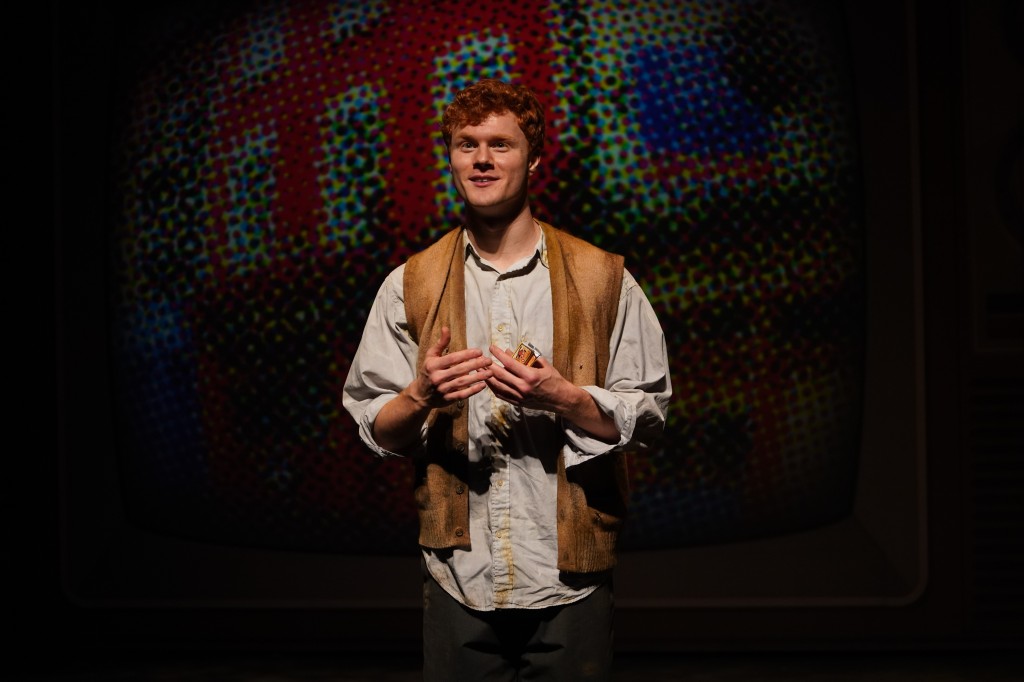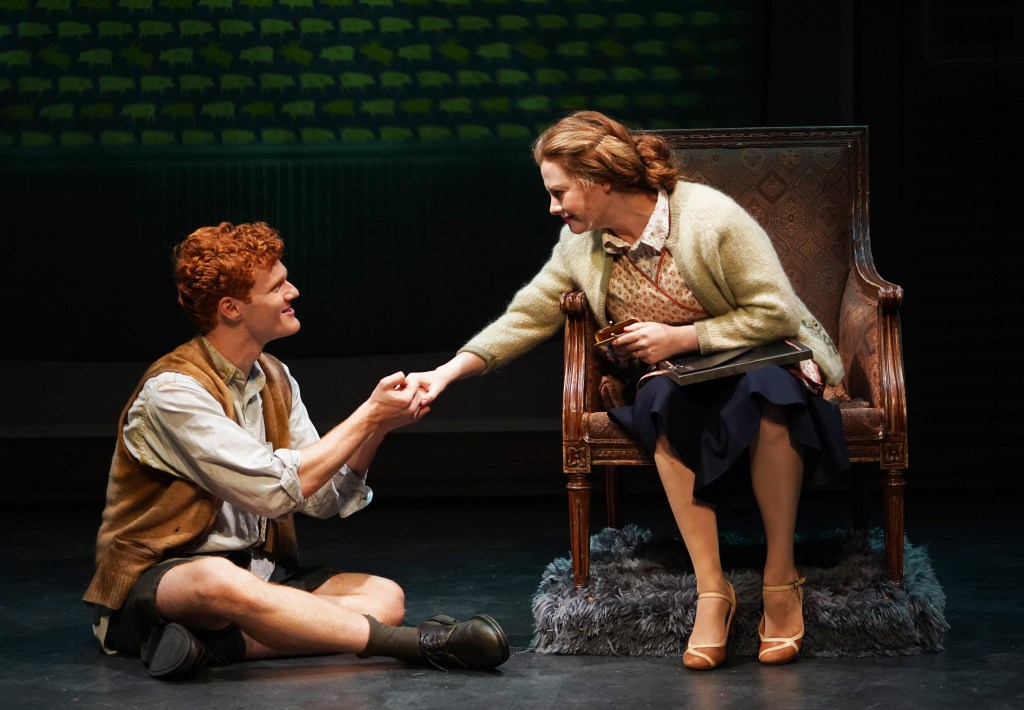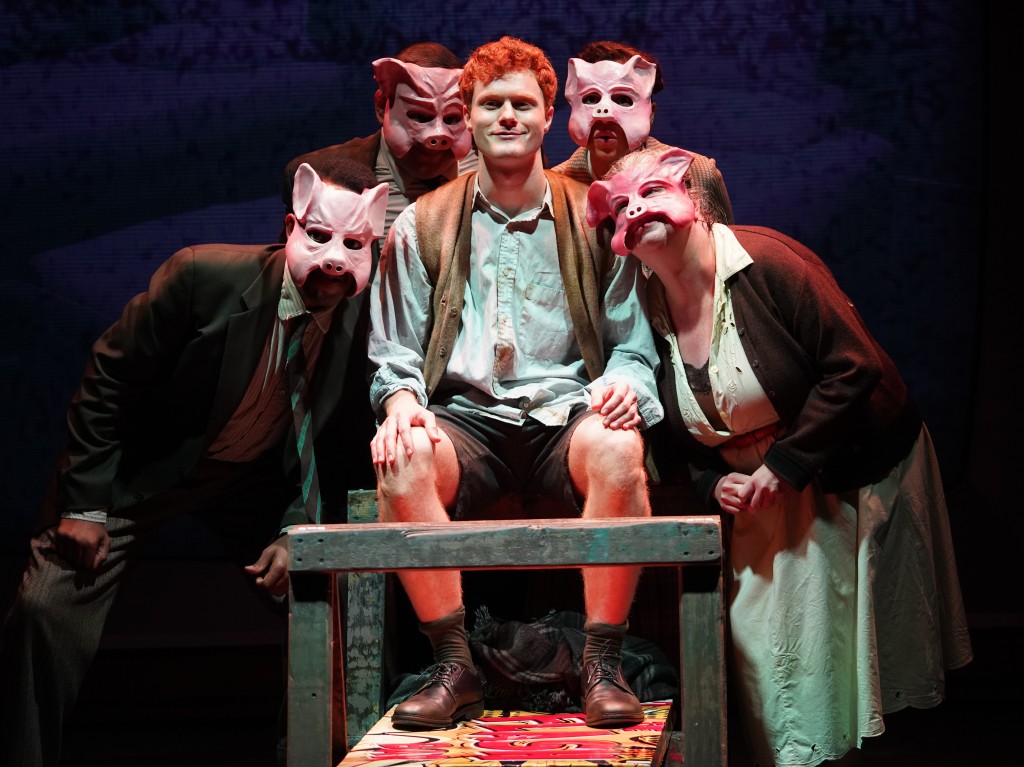Blog Archives
‘The Butcher Boy’ Irish Rep’s Brilliant Production, A Review
Posted by caroleditosti

From the initial moments when Nicholas Barasch’s Francie Brady introduces himself to us with wide-eyed innocence and enthusiasm in Irish Repertory Theatre’s The Butcher Boy, we are mesmerized by his beauty and youthful vitality. Director Ciarán O’Reilly’s choice of actor is spot-on, for Barasch with openhanded good will carries us into the depths of Francie’s mind-bending phantasmagoria that leads him to a psychotic abyss from which he most probably will never escape.
The Butcher Boy, a new musical fashioned by the uber talented Asher Muldoon, who wrote the book, music and lyrics, is based on Patrick McCabe’s titular novel, which also engendered an award winning film adaptation that McCabe helped co-write. The novel won the 1992 Irish Times Irish Literature Prize for Fiction and was shortlisted for the 1992 Booker Prize.
Muldoon, who, with Sammy Grob accomplished the orchestrations and vocal arrangements, has created a genius work that will be controversial because it is refreshingly “out there” and unique. In the Playbill, the playwright discusses being enamored of the novel as a junior in high school. Muldoon’s passion propelled him to focus all of his talents on creating a musical adaptation that is prescient, strangely heartfelt, darkly ironic and tragicomic. Thanks to the director, cast and creatives, this amazing production lingers in one’s memory long after one leaves the Francis J. Greenburger Mainstage of the Irish Repertory Theatre, where The Butcher Boy currently runs until 11th of September.
O’Reilly’s vision of Francie’s world merges fantasy with reality creating an extraordinary surreality through which we understand the flashback vignettes that Francie Brady presents about his childhood. In Francie’s narration one may wonder if he is reliable, and as his descriptions to the audience enthrall us, we know he is not. However, that is not the point. What is the point is the emotional content which he confides to us that gains our sympathy. In a straight-forward manner he reveals how he takes his own form of vengeance on a narrow-minded town that offers him few opportunities to be anything other than what it defines him to be. Agree with him or disagree, his story is authentic, comedic and poignant. Considering the current state of the world and young men his age who are desperate for many reasons, it is also very believable.
Using a well conceived set design by Charlie Corcoran dominated by a large TV screen center stage upon which various thematic projections play out, O’Reilly highlights Francie and friend Joe Purcell’s escapism into the television shows of the time, i.e. The Twilight Zone and the The Lone Ranger, revealing their powerful influence on impressionable minds. Along with comic books whose memes cover their board slatted “hideaway” that lines the outer walls of the stage and boxes in the action, we realize how Francie and Joe (Christian Strange), are shaped by 1950s-1960s media.

Television, newspapers, magazines, comics magnify cultural entertainment curiosities and heighten fears of aliens, communists, monsters and the threat of nuclear annihilation. Muldoon peppers some of Francie’s memories with these notions, as he presents this time in Francie’s life of beginnings and endings, of happiness and loss, of friendship and peace, which devolve into increasing humiliation and chaos, after triggering events set Francie’s alienation in motion.
Spurred on by Joe’s idea, Francie and Joe run off with classmate Philip Nugent’s comic books. Mrs. Nugent (Michele Ragusa), visits Francie’s Ma (Andrea Lynn Green), censuring Francie and Joe for their abuse of Phillip (Daniel Marconi). Instead of appealing to Francie’s and Joe’s sense of honor to return the comics and restore good will between the families, Mrs. Nugent takes the punitive, vengeful approach. With classist arrogance, she insults mother Annie and blames Francie’s actions on his “disgraceful,” alcoholic Da. She cruelly carps that Annie’s husband isn’t raising their son properly because he’s a drunk and stays in bars from “morning to midnight.”
Mrs. Nugent’s indelible words “he’s no better than a pig, a pig,” imprint Francie’s mind with the full force of condemnation and verbal emotional abuse that neither Annie nor Francie can adequately defend against with clever, rebounding wit. They take in her scornful denunciation, like a blow to the head that knocks them unconscious. It is a blow from which Francie never recovers.
For Annie and Francie Mrs. Nugent’s abusive, humiliating words ring with a “truth,” whose obvious malice is meant to destroy. Da (Scott Stangland), beats “sense” into Francie, despite Annie’s protest, as Francie finishes singing the song he and Joe exuberantly started at the top of the play, “Live Like This Forever.” During his father’s abuse, Francie reminisces about this “sweet and simple time,” singing as his father beats him, “if we lived like this forever, we’d be fine.”
We note the irony in this flashback, as Francie presents the seminal event from his past. Indeed, if this shameful time is “sweet,” what terrible events will come where Francie and his parents “are not fine?” This is the first in a series of turning points when Francie reveals incidents after which he and his parents never gain solid footing again, as they live in “the bog life” of the small town, where everyone knows everyone else’s business, and mores embrace “upright,” Catholic behavior. Such fine behavior eludes the Brady family.

The Nugent incident most probably sets off Annie into despairing her situation. As a Catholic, she is unable to divorce an alcoholic husband who doesn’t work. One day Francie finds her standing on a table with a fuse wire looped like a noose, hanging suspended from the ceiling. When she “goes away,” after suffering a nervous breakdown, Francie understands that she was taken to “the garage” for repairs. Interestingly, her breakdown incites Francie to a comedic expression of rage, when on the highroad, he meets Mrs. Nugent and Phillip, enemies and authors of his demise. Francie confronts them, but not with the truth of how much Mrs. Nugent devastated him with her comments. He can’t articulate his emotional state, because he is incapable of verbalizing his sense of injustice and hurt at her judgment of him and his family. His behavior reveals he most probably agrees with her excoriation which he internalizes in an act of self-annihilation.
Unable to ignore her, his rage erupts in a clever ruse. He warns her that she and Phillip must pay the “Pig Poll Tax” to pass by him, the guard, who will protect them from the ranging piggies who may have gotten loose from their sty. His imaginative, bullying lie is escapist and funny, but it is also an incredibly sinister beginning to the end of his “sweet” childhood. As he demands payment for protection, Francie psychically hallucinates four pigs who become his companions (“Big Fat Piggies!”). Manifestations of his fury and rebellion against a class that rejects him, the piggies lead him on a tragic course that predictably ends in Francie’s embodying the title of the musical.
Though Phillip and Mrs. Nugent don’t see the piggies (David Baida, Carey Rebecca Brown, Polly McKie, Teddy Trice), the malevolent creatures materialize in macabre half masks. They sing, ridicule, cavort and dance, thanks to the choreography of Barry McNabb. Francie answers Mrs. Nugent’s damning label by using the piggy metaphor as a weapon against her and Phillip. The piggies suggest they will infiltrate the town and soon, “no one will know who is you and who is a piggy anymore.”
Inferred is the understanding that all, including Francie, are piggies that are capable of terrible mischief and evil, unless they are controlled. But who has the power to stop insidious thoughts before they materialize into acts of piggy violence? Furthermore, can an insulting condemnation that, like a bomb, vaporizes the soul of a child, ever be properly answered? Or is the wound, that never heals, a permanent debility framing their life, as they carry it with them into adulthood? The musical conveys these questions and thematically answers them by the conclusion.
Francie’s clever use of Mrs. Nugent’s insult to sardonically reply with a monetary demand for protection against a threat of future piggy violence, allows him to disconnect from her humanity, as she has disconnected from his with her epithet. However, Francie’s imagination takes this to an extreme. With the emergence of the four piggies, who haunt him until the musical concludes, it is clear Francie has internalized the pig metaphor in self-hatred. Tragically, neither his mother nor his emotionally removed father give him the tools to understand, negotiate around and forgive Mrs. Nugent’s classist, un-Christian attitude. Left to his own devices, his psyche rebounds into fantasy and comic book heroes, and the strange talking piggies, who emerge whenever they like.

The four piggies become his interactive companions, signifying Francie’s deteriorating mental state. They torture him to “live down” to Mrs. Nugent’s definition of the Brady family as pigs. They encourage him to deeds that are invariably anti-social, dangerous, aggressive and frighteningly rebellious.
As events unfold, Francie’s home situation worsens. His mother returns, sprung out of the psychiatric hospital to prepare for Uncle Alo’s yearly visit. She bakes cakes in a flurry of activity. Hypersensitive to gossip, Francie is aware of the townspeople’s view of his mother and the Brady family. However, many show up to the party Annie and Da hold for Uncle Alo (Joe Cassidy). Though the occasion begins with uplifting hope (“My Lovelies”), Da reveals the truth of Uncle Alo’s situation and embarrasses him in front of the party guests. A fight ensues and Francie realizes that he can’t tolerate the hellishness of his home life, so he escapes with the piggies to Dublin (“Ride Out!”).
On this fantastic journey where he imagines he can have adventures like a TV hero, he finds affection from a family who takes him in for a while. Though he lies about his identity, he manages to strike a rapport with William (Joe Cassidy), and Kathleen (Michele Ragusa), who sing optimistically about their lives, despite the depressing threat of nuclear war (“Still Here”). Their optimism is a key to their good nature and kindness toward Francie. The couple parallels his Uncle Alo and former love Kathleen, so they are a comfort to Francie. Additionally, he has a sweet conversational interlude with their daughter Mary (Kerry Conte), who forgives his theft from the cash drawer of the shop where she works, after he promises not to make trouble for her.
During the time he is in Dublin, he writes to Joe who chides Francie for leaving him behind. Without Francie near, Phillip approaches Joe to be friends. Because he is lonely, he accepts Phillip’s friendship (“Phillip’s Song”). Whether wittingly or not, Phillip’s divide and conquer strategy works. Francie is upset about any friendship between Joe and Phillip, encouraged to anger by the pigs who torment Francie about it. Joe is converted to Phillip’s lifestyle, which Francie ridicules and Joe defends. Provoked by the pigs, who increasingly dominate his world, Francie fears losing Joe’s friendship. What he fears eventually comes upon him.
It is after the lovely interlude with Mary, whom he asks to marry him, the pleasant respite of relative normalcy with a kind-hearted family and lovely daughter ends abruptly. To the surprise of William and Kathleen, Da, who Francie told them was dead, collects his son, and they return home to a devilish situation. Annie has drowned herself in the pond. Unable to appropriately grieve, Francie is caught up with Nugent’s statement about “the Bradys.” She and town gossips once more have proven that the Brady family are “out of control,” subjects for pity and gossip, which Francie knows is said about him. The piggies stir him to anger and paranoia (“Francie Gets Mad”).

Lashing out, unable to cope with his mother’s suicide, Francie’s psychotic emotional state converges in a series of events where he attempts to get revenge on Phillip. He is stopped by Joe who promises in a blood oath to maintain his friendship with Francie. It is an oath that Joe betrays in the second act, completely won over to the classist Nugents, ascribing to their lifestyle. Enamored by the Nugent’s status, Joe turns his back on Francie, who he rejects completely by the end of Act II. However, assured by their blood oath, Francie attempts to be “good,” but cannot help but humorously mock the Nugents during an imagined absurdist scene where he has tea with them (the superb props for this scene reflect his ridicule of their pretensions).
When he makes a faux pas and embarrasses himself during tea, he rebels against their notions of polite, well mannered society. He trashes their house, encouraged by his piggy companions (“The Magnificent Francie Brady/The School for Pigs”), and does something uncouth, unspeakable and very funny (seamlessly rendered by the creative team), which scandalizes the town and proves Francie is indeed the pig Mrs. Nugent declared him to be. The townspeople talk about Francie’s “act” years later. They are so hypocritically shocked by his impropriety.
As Act I ends, the creatives have authentically brought to life Francie’s world in a panorama of surreal, phantasmagoria, which he has come to depend upon to survive. It is an imagined reality where he increasingly fights off the bitter ugliness of his pitiable circumstances. Defiantly using hallucinated creatures as weapons to embody his emotional urges, whims and eruptions of anger, he exacts his revenge against his enemies, almost everyone. Confused, dislocated that it is he, himself, who effects the paranoid danger, he revels in self-destruction..
Enhancing Francie’s world and devolution, Muldoon’s lighthearted music (a combination of lyrical pop, ballads and Irish influenced tunes directed by David Hancock Turner), is incredibly sardonic. The melodies in which the piggies show up are especially so, as they dance and evilly insinuate their presence into Francie’s inner life and outer actions. The pleasant lyricism conveys tragedy in a clash of potent, antithetical forces which are as intentionally jarring as Francie’s downhill descent into madness, superbly rendered by Barasch.
Clearly, Muldoon reflects novelist McCabe’s themes of classism, bigotry, social hypocrisy, media escapism that exacerbates psychosis, as well as the ineffectiveness of mores and religion to humanly help individuals like the suffering Francie. Above all, Muldoon and the creative team in this wonderfully realized production remind us that inhumanity begins with cultural, socioeconomic divisions of superior and inferior people, instead of viewing the human community with equanimity. The extent to which Mrs. Nugent’s defamation harms Francie’s soul, reveals how hate and violence crescendos in a terrible chain reaction that affects all in the town.
Like a fly caught in a spider’s web of malice, Francie cannot extricate himself from internalized self-damage. The bits of kindness and feeling he experiences from friend Joe, his Ma, his Uncle Alo, Kathleen and the Dublin family are too briefly felt to counteract his illness and propel him onto a path of self-love and self-forgiveness. When he attempts to seek redemption from his piggy inner state with visions of Mother Mary, the hope she brings is a betrayal and a canard, luring him to an apotheosis of violence at the play’s end.
If Francie fails, it is because religion, family, friendship, townspeople fail him. All unwittingly cooperate in this endeavor and a potentially fine human being is cut down and butchered by all who contribute. Indeed if “No Man Is an Island,” as the John Donne poem states, Francie and the town surely exemplify this to a terrible degree.
The class distinction between Francie, Joe and the Nugents is suggested subtly in Charlie Corcoran’s set design of the meticulous Nugent kitchen with cabinets and a counter top covered by a lovely, white, flowery, embroidered cloth. These elements are in direct contrast to the Brady household which is minimalist and stylized. For example, events and props define the Brady space: a table set up with cakes here, a chair which Da sits in there. By comparison, theirs is a shabby, opaque space that others like Mrs. Nugent may write upon with arrogant insult.
From costume design (Orla Long), lighting design (Kat C. Zhou), sound design (M. Florian Staab), production design (Dan Scully), mask design (Stanley Allan Sherman), and properties (Brandy Hoang Collier), we are brought into Francie’s unforgettable world with empathy, as we stand in his shoes and feel the personal terror of what he experiences. In its radical extremist point of view, the production succeeds in allowing us to feel Francie’s pain and his unique and astounding configurations to rid himself of it.
The ensemble are first-rate talents; the leads have lovely, strong voices. Barasch, Strange and Marconi are exceptional together, inhabiting the iterations of boyhood, reflecting diverse personalities and morphing with subtle nuance as they grow into adulthood. Onstage in each scene, continually pouring out of himself, Barasch gives an incredible, moment to moment performance, peeling back the veil to show us the development of Francie’s psychotic mind.
This is a vital musical and incredibly current. Though the setting takes place sixty years in the past in Clones, Ireland, the situation and title character remind us of the teenagers of Columbine, Virginia Tech, Marjorie Stoneman Douglas High School and Ulvade, Texas. Clearly, The Butcher Boy in whatever form, film, novel, musical is continually prescient, revealing failures in every institution that should support children. And on a human, personal level, it reminds us that presumptuous, classist, arrogant words tinged with hatred, show the wickedness of the speaker’s heart, not the ones labeled.
Irish Repertory Theatre’s production is rich with meaning and profound with empathy. It is one to see. For tickets and times go to their website: https://irishrep.org/tickets/